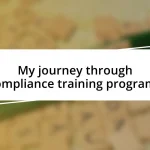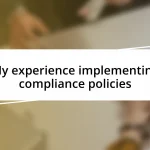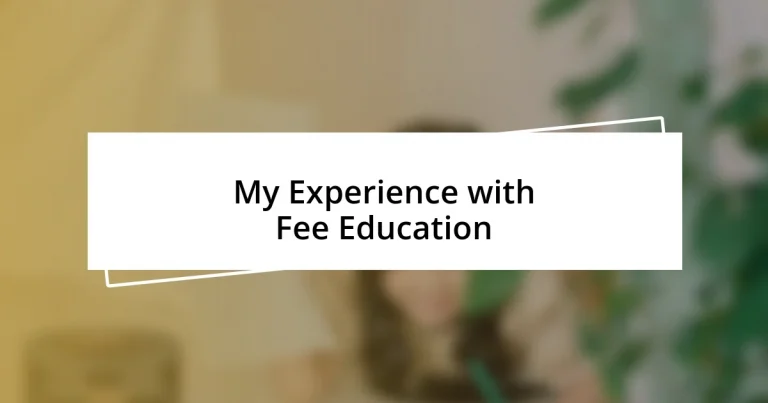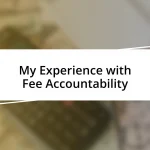Key takeaways:
- Different fee education models, such as sliding scales and income share agreements, present both opportunities for inclusivity and challenges regarding sustainability and financial clarity for students.
- Personal experiences highlight the emotional impact of financial challenges in education, emphasizing the importance of community support and alternative funding models.
- Effective learning strategies, networking, and utilizing available resources play crucial roles in successfully navigating fee education and empowering students to manage their finances.
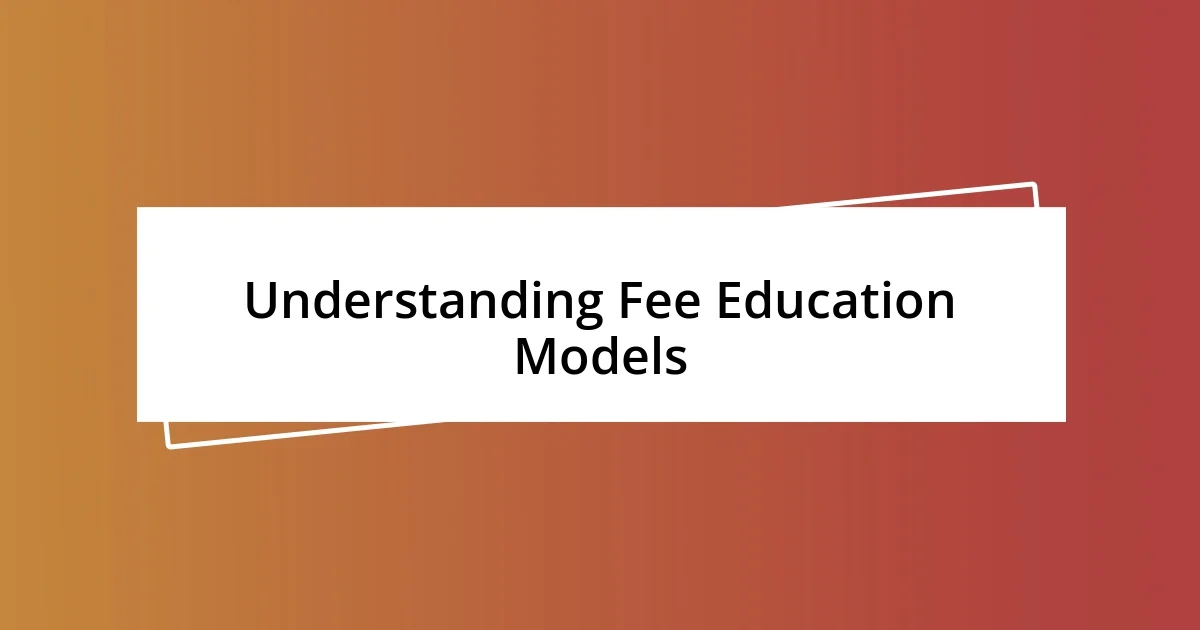
Understanding Fee Education Models
Fee education models can vary significantly depending on the institution and its mission. I remember feeling a whirlwind of emotions when I first encountered a sliding scale model at a community college. It was refreshing to see tuition adjusted based on income levels; it made education accessible to everyone, but I couldn’t help but wonder, how sustainable is this for the institution?
Then there are fixed fee structures, which can feel daunting. I often thought about the pressure these models put on students to secure financial aid, especially for those without stable family support. How do we ensure that all students have equal opportunities to thrive in environments where tuition is non-negotiable?
Lastly, I’ve seen institutions experimenting with income share agreements, which made me reflect deeply on the concept of risk-sharing in education. If I had graduated with student debt but a promise of repayment based on my future income, would I have felt more empowered or burdened? This innovative yet complex model raises the question: can we balance financial sustainability for schools with equitable access for students?
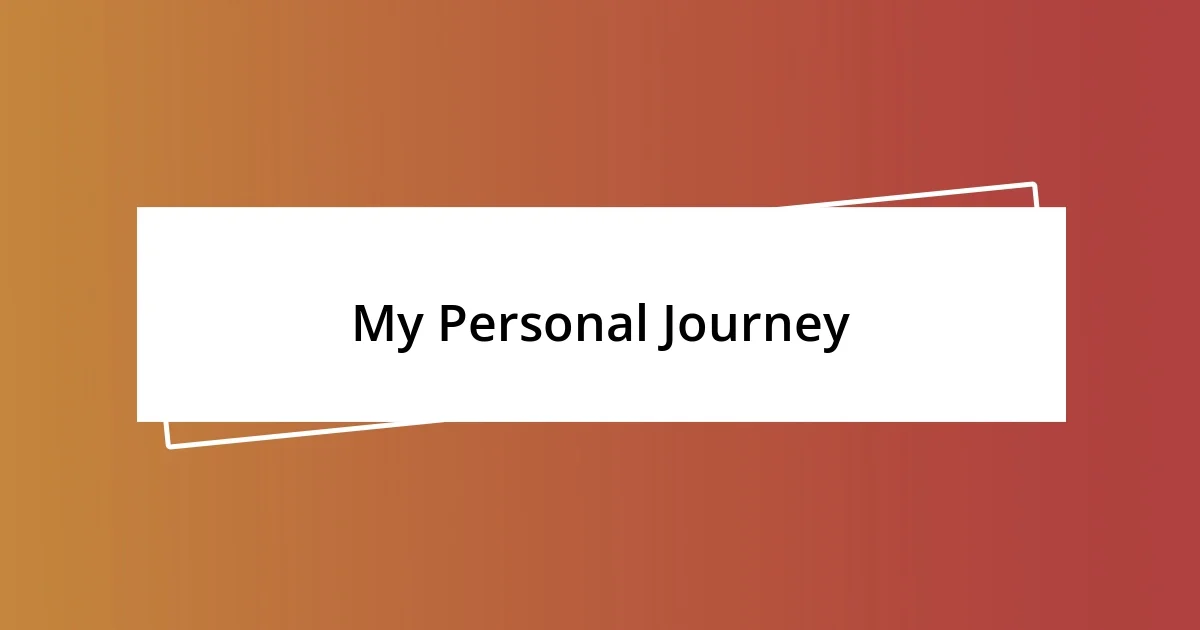
My Personal Journey
My experience with fee education has been anything but ordinary. I vividly recall my first college experience—it was overwhelming yet liberating. I encountered a mix of emotions when navigating financial aid applications and scholarship opportunities, each step a reminder of my aspirations and the financial hurdles ahead. There were nights I lay awake, anxious about student loans, wrestling with what they meant for my future.
- The joy of receiving my first scholarship was exhilarating, making me feel seen and valued.
- I often felt torn between academic choices and financial burdens, always wondering if I was making the right decisions.
- Learning about alternative funding models made me hopeful; they sparked discussions about education being a communal, rather than an individual financial burden.
As I moved through different educational phases, I found myself grappling with the stark differences in tuition structures. The emotional impact of a fixed fee model became clear when it hit me—many of my peers could not afford basic necessities because they were sacrificing everything for tuition. I remember sitting with friends at a coffee shop, sharing our worries over tuition fees, and dreaming of a system where knowledge wasn’t a commodity but a shared benefit.
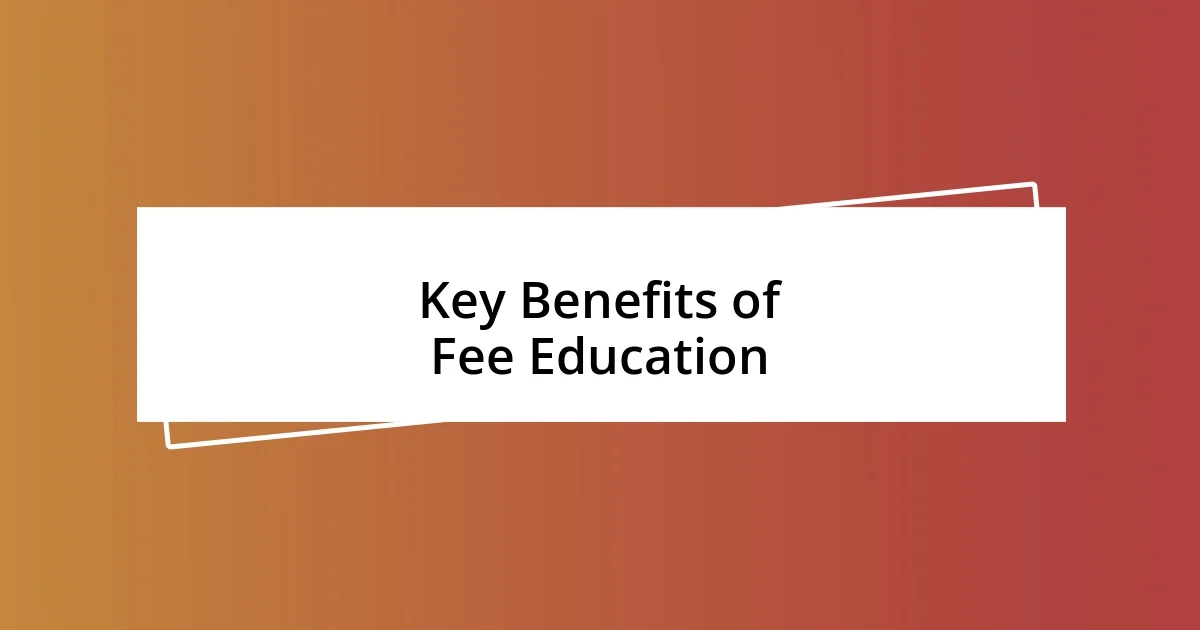
Key Benefits of Fee Education
One of the standout benefits of fee education is its ability to foster inclusivity. When I think about the flexible payment options, it instantly reminds me of a dear friend who was able to pursue her degree despite facing significant financial challenges. She benefitted from a sliding scale that adjusted her fees based on her family’s income. It was heartwarming to see how this model not only empowered her but so many students who otherwise might have been sidelined in their academic journeys.
Another advantage is the accessibility of resources to students. In my own experience, universities with fee education models often invest in comprehensive support services. I remember taking advantage of tutoring centers and counseling services that were funded by tuition fees. These resources not only improved my academic performance but also contributed to a healthier college experience overall. Knowing that I was not just a number, but part of a supportive community, made all the difference in my educational pursuit.
Moreover, fee education promotes transparency in financial planning for students and families. I had a mentor who stressed the importance of budgeting, and when universities provide a clear outline of what fees cover, it becomes much easier to plan ahead. This clarity helped me understand how tuition contributes to more than just classroom instruction—facilities, extracurricular activities, and future job placement services were part of the investment. As I worked through my studies, I gained not just academic knowledge but also essential life skills in financial management.
| Key Benefit | Description |
|---|---|
| Inclusivity | Models like sliding scales help students from diverse backgrounds access education. |
| Resource Accessibility | Tuition funds often go towards essential support services that enhance learning. |
| Financial Transparency | Clear breakdown of fees aids students in budgeting and understanding their financial commitments. |
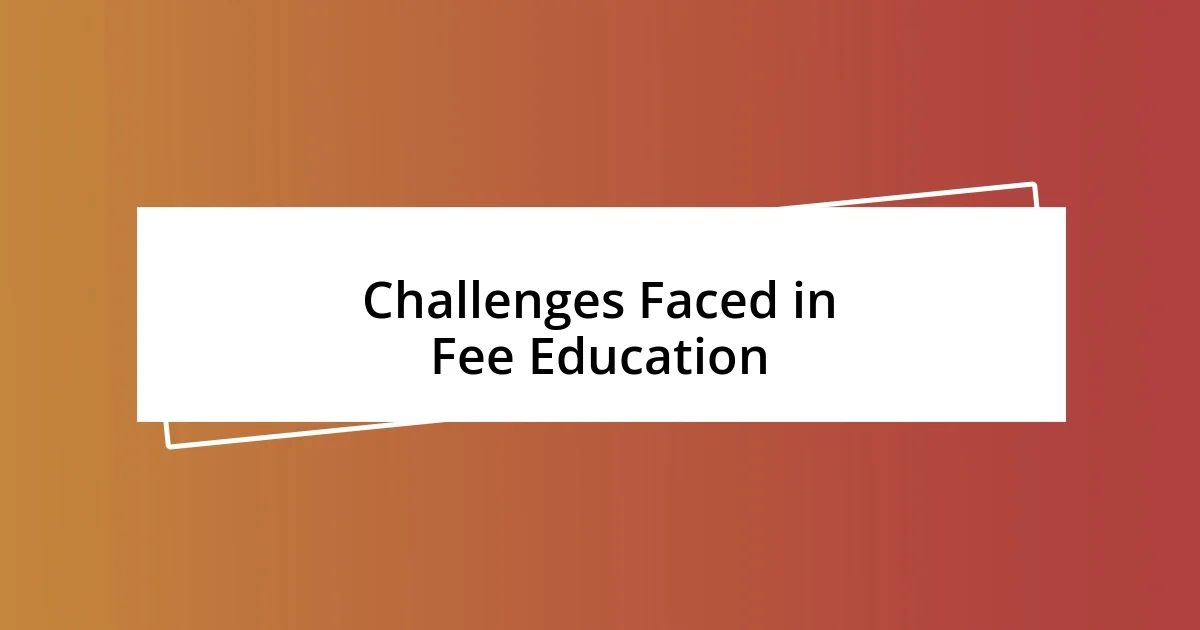
Challenges Faced in Fee Education
Navigating fee education certainly presents its fair share of challenges. I can recall the moment I received a bill that seemed to target my already tight budget—it felt like a slap in the face. My heart sank as I wondered how I would juggle work commitments alongside my studies. How many students find themselves in similar predicaments, frantically calculating whether they could stretch a dollar over textbooks or groceries?
One of the most significant hurdles I encountered was the constant fear of unexpected costs. I remember one semester when my financial aid fell short, leaving me scrambling for last-minute loans. The anxiety was palpable; I often feared I’d miss out on opportunities simply because I couldn’t afford the associated costs. It made me realize just how critical it is for institutions to have clear communication about additional fees, so students can plan accordingly.
Additionally, feeling isolated due to financial strain is something I haven’t gotten over. I vividly remember sitting in class while my peers excitedly discussed their study abroad plans. I felt this pang of envy, wondering if I would ever have that chance or if I was destined to stay grounded by my financial realities. It’s disheartening to think about how many passionate individuals may have their aspirations curtailed by a lack of financial resources. Wouldn’t it be fantastic if institutions recognized this and created more pathways for all students, not just those who can afford it?
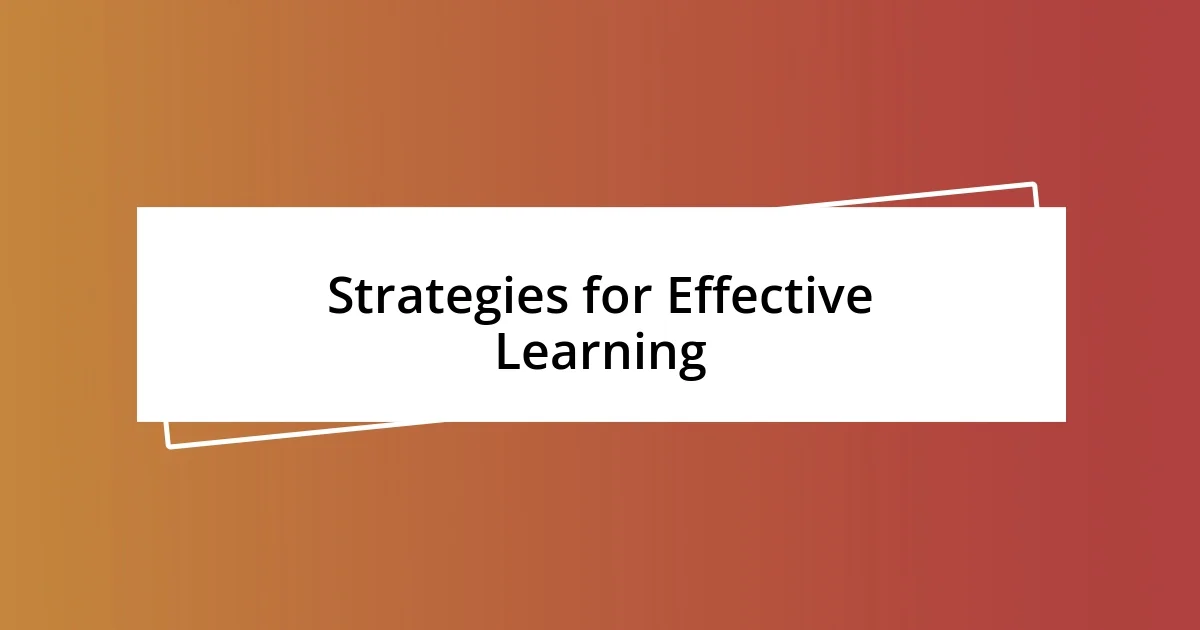
Strategies for Effective Learning
Effective learning often relies heavily on organization and planning. Personally, I found that creating a study schedule transformed my academic experience. By mapping out my weekly goals, I could see clear milestones that kept me motivated. Have you ever tried breaking your tasks into smaller, manageable chunks? It’s amazing how focusing on one thing at a time can alleviate that overwhelming feeling.
Another strategy that really made a difference for me was engaging with the material actively. Instead of passively reading textbooks, I took notes, highlighted key concepts, and even discussed topics with classmates. I remember forming a study group where we quizzed each other; that interaction turned studying into something enjoyable rather than a chore. Isn’t it incredible how sharing knowledge with peers can reinforce your own understanding?
Lastly, self-reflection is key. Taking a moment to evaluate what study methods worked well for me—and which didn’t—allowed me to adapt over time. For instance, I learned that while flashcards helped cement vocabulary, visual aids were the way to go for understanding complex theories. Have you taken the time to assess your own learning techniques? It really can lead to significant improvements in how you absorb and retain information.
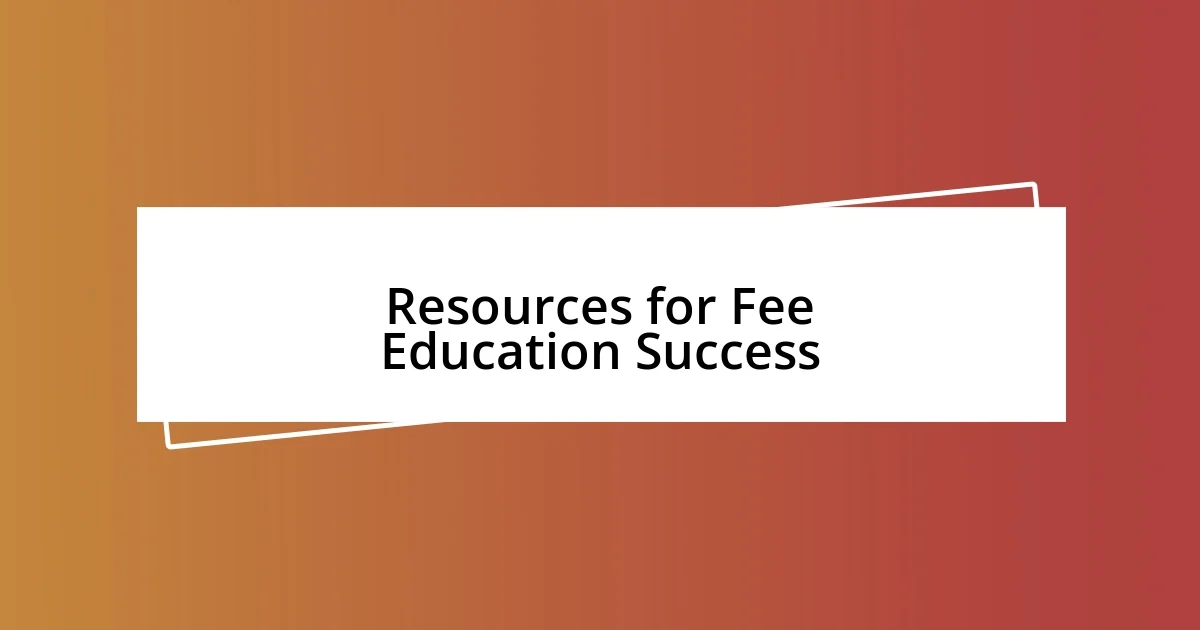
Resources for Fee Education Success
I discovered that networking plays a pivotal role in navigating fee education successfully. I remember attending a workshop hosted by my university’s financial aid office, where I met some incredible mentors. Not only did they help me understand scholarship opportunities, but they also offered invaluable advice on budgeting for my everyday expenses. Have you ever considered how a simple conversation with someone knowledgeable can open doors to resources you might not have known existed?
Additionally, technology has been a game-changer for many students seeking fee education support. I found various apps that helped me track my spending and find student discounts around campus. Just last semester, I saved a surprising amount on textbooks by using an online resource that compared prices across different platforms. Isn’t it fascinating how a little tech-savvy can empower your financial decisions?
Finally, I can’t stress enough the importance of utilizing school resources beyond just academics. I vividly recall attending financial literacy workshops—those sessions reshaped my understanding of loans and interest rates. They taught me how to manage my finances effectively, empowering me to make informed choices. Have you tapped into your institution’s resources? There’s a wealth of information available that can turn the tide in your favor.
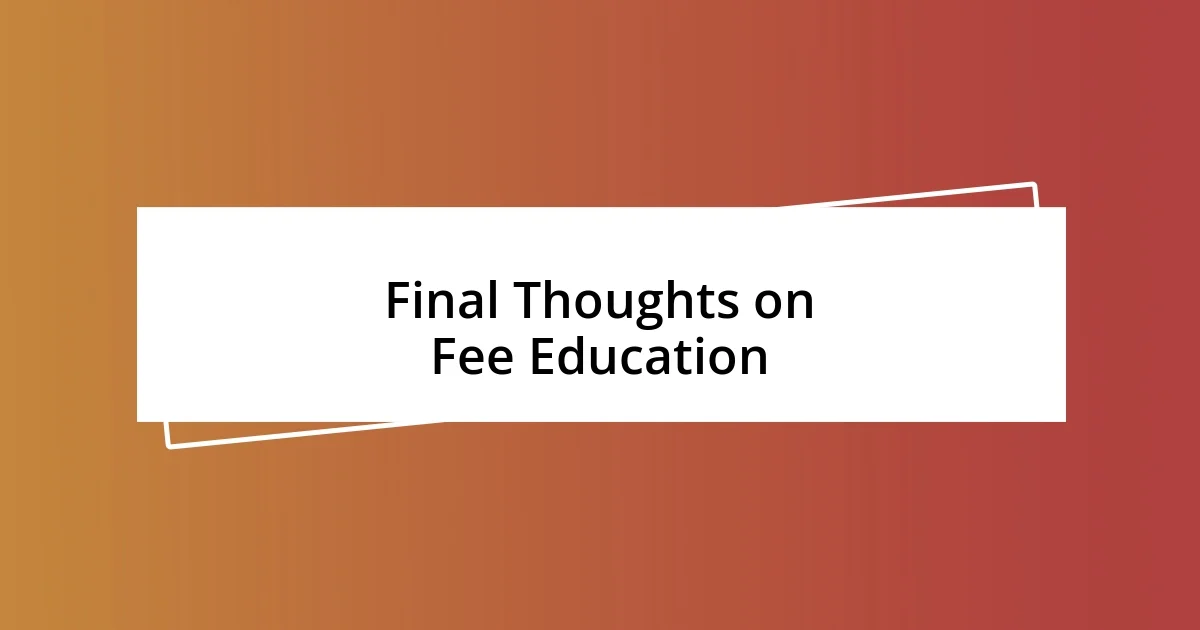
Final Thoughts on Fee Education
Fee education can be a transformative experience, but it requires navigating a complex web of resources and strategies. I remember the moment when I first applied for a scholarship; it felt like taking a leap of faith. The anxiety mixed with excitement was palpable. Have you ever felt that rush of adrenaline when doing something uncertain but potentially rewarding? It’s moments like these that motivate us to push beyond our comfort zones.
As I reflect on my journey, I realize that community played a crucial role in my success. The friends I made during outreach programs not only became my support system but also enriched my understanding of fee education by sharing their stories and strategies. Have you ever experienced the power of collective learning? That camaraderie in studying and sharing tips can be invaluable, turning what could feel like an isolating process into a shared adventure.
Ultimately, what I’ve learned is that fee education isn’t just about securing funds; it’s about fostering a mindset of resourcefulness and resilience. I often think back to those overwhelming days filled with paperwork and deadlines. What helped me persist was my commitment to a brighter future, knowing that every ounce of effort would pay off in the long run. How does your motivation align with your financial decisions? Exploring that connection can deepen your commitment to your educational journey and its financial implications.



